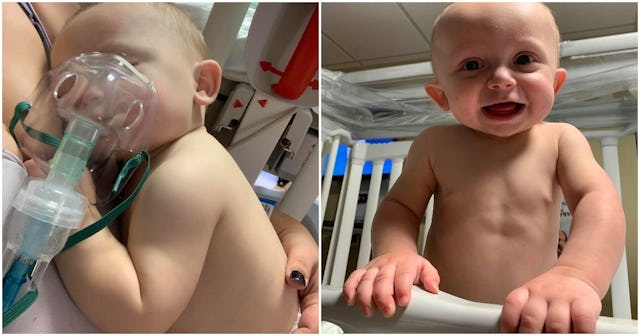Mom Of Infant With RSV: 'Don't Be Selfish — Don't Kiss Babies'

This woman’s son spent six days in the hospital after contracting RSV
Respiratory Syncytial Virus (RSV) is a common respiratory virus that typically causes mild, cold-like symptoms, but it can be serious, especially for infants and can result in serious complications or even death. One mom is reminding people just how susceptible babies are to RSV and if you see a baby and think to yourself, “Oh, they are so adorable, I just need to kiss them,” — don’t.
“Adults- you are contagious up to 24 hours before you start showing symptoms! Please keep your mouths/breaths away from a baby’s face, hands, and feet,” EMT and mom Ariana DiGrigorio wrote on Facebook. “Don’t be the reason a baby is hospitalized (or dead).” Her post warning other parents came after her son, AJ, had to spend six days in the hospital at just eight-months-old after contracting RSV from an infected adult.
“It’s super awkward as a parent to have to tell someone (especially a family member or friend) to step away from your baby,” DiGrigorio continued. “It’s also super difficult to stop someone from kissing your child after they’re already going in for the kiss. Don’t be selfish. Don’t kiss babies. It’s not worth it.”
Ariana DiGrigorio
DiGrigorio tells Scary Mommy that AJ got sick in February 2018 and had to be admitted to the PICU and given breathing treatments. “He actually had to be sedated during the whole 6 days we were there,” she said. Although he’s doing better now, he was also diagnosed with asthma because of the RSV and he goes to see a pulmonologist every four months.
Ariana DiGrigorio
According to the CDC, an estimated 57,000 children younger than five years old are hospitalized due to RSV infection every year in the U.S. Infants who are hospitalized may require oxygen, intubation, and/or mechanical ventilation. Though most improve with this type of supportive care, RSV can cause death if not treated quickly enough.
RSV can present differently in children than adults, causing irritability, decreased activity, decreased appetite, and apnea (pauses while breathing). Fevers may not always occur so it can be difficult to diagnose. Those who come in contact with babies can make a difference by washing thier hands frequently, cleaning surfaces regularly, and by avoiding touching their eyes, nose, and mouth with unwashed hands.
Ariana DiGrigorio
Bottom line, if it’s not your baby, please don’t feel like you have the right to kiss them or come in close proximity of their face or hands. Yes, babies are cute and kissable and well-meaning people may think stealing a kiss on their cheeks or fingers is a sign of affection, but it can have serious consequences.
Ariana DiGrigorio
“Also, if you’re sick, please stay home,” DiGrigorio warns. “What might be a ‘sinus infection’ or ‘allergies’ to you, could translate to a life-threatening illness for a baby.”